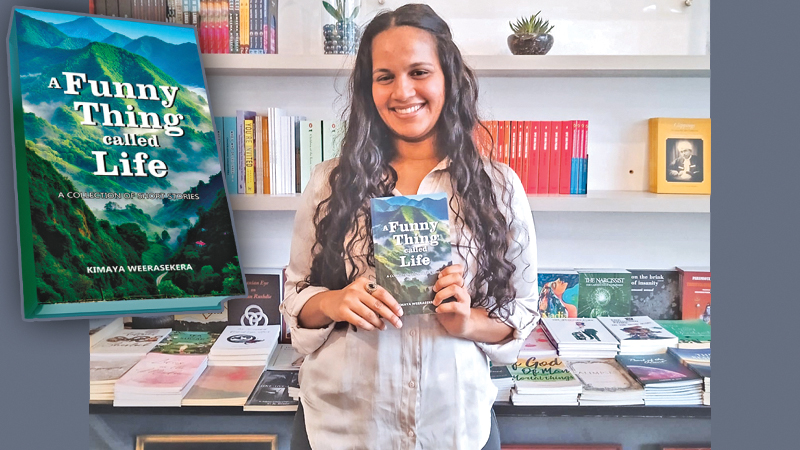Kimaya Weerasekera started writing when she was in her early 20s. Words came somewhat easily to her.
“When I had an idea to put down on paper, it was something that I enjoyed doing.
“I didn’t know about the flash-fiction genre until my cousin introduced it to me. I actually found it really interesting because to be able to tell a story in a limited amount of words was like a challenge to me and something that I really enjoyed doing.”
Kimaya would enter competitions which further motivated her. She also enjoyed sharing them with her family and friends. “You know how you are always critical of your own work and constantly think it’s not good enough? They are the ones who really encouraged me to get out of that mentality, find confidence and get my stories out there,” recalled Kimaya.
Today she is the author of her debut short story collection, ‘A Funny Thing Called Life’ published by The Jam Fruit Tree Publications.
All these stories in this book had a similar theme as they talk about certain situations in life that we find ourselves in. And a lot of these stories are oftentimes things that she has heard or seen from far. It’s also how she perceives situations, how we react to life and her observations. Therefore, while certain stories she has written out of her own experiences, not all of them are.
Huge step
“The people in my life really gave me the push to take this huge step of publishing my work. I think it’s normal to get protective of your stories where you don’t want to share them because you don’t know how they will be perceived. But I believe, like in anything in life, there are people who would enjoy your work and people who won’t. “Therefore, I thought, if I don’t put my book out there because of people who may not like it, again it would stop me from living the life that I want to live because of negative comments,” said Kimaya.
She also believes that as creative people, we should be open to criticism and it shouldn’t be something we should avoid or fear. She said that there are some books that she read which she didn’t like and some books that she really enjoyed. Therefore, she admits that it definitely may apply to her own work as well. But at the end of the day, as a writer, she is proud of her creation, and believes it to be the most important mindset any creator should have. “I find it easier to write a short story as opposed to a novel, I find it easier to wrap up a story quickly than drag it on,” said Kimaya.
The short stories in this collection are stories that Kimaya had already written and put aside. “They were all over the place really and when I decided to put it all together, I just picked the stories I wanted and collected everything into one book.”
Kimaya would usually write the story and send it to a few people who would give her their feedback. She has changed some of the stories because of this feedback and constructive criticism she got because it made sense and encouraged her to look at them from a different perspective. For her, the one main challenge was to write the blurb. Even though all of the stories have a similar theme, they’re still different stories which made it difficult for her to wrap them all up in the blurb of her book.
Publishing process
However, Kimaya said that the publishing process was much easier than she imagined it to be. In her head, she thought the publishing process would be the most confusing and complicated part of it all. However, Kimaya recalled how she was barely stressed out throughout the process. Instead, it was a fun and exciting journey at The Jam Fruit Tree Publications.
“One thing I was scared of is, what if at the end of it, my stories change a lot and end up not being my work?” she said. “But after my first conversation with my publisher, Jeremy Muller, that fear went out of the window because he actually spoke out my fear and gave me assurance before I could even say anything. That really helped me be at ease with the whole process because I knew that ultimately, the end result wouldn’t be anything that I disagreed on. I really have to thank the publishing team because they really made it easy for me and I felt like I didn’t have to do much,” Kimaya said.
Seeing the cover for the first time gave her so much pride. This had been something she wanted to do for a long time and it’s like a dream come true for her to see her name on the cover. “It gave me confidence in myself a little more because I realised that beautiful things can happen and dreams can come true. The first day I held the book in my hand was really emotional for me as well,” recalled Kimaya fondly.
The author has touched on several social issues. In one of her short stories named ‘The Assistant’, she talks about societal judgment. The author explained how we are so quick to judge somebody without knowing their entire story. We would generally see something that is deemed incorrect and then immediately come to the conclusion that this individual is wrong. Kimaya believes that we don’t have the right to judge anyone without knowing the full story. However, most of the time in our head we have made up our own version of these stories and we come to various assumptions.
Double standards
Another short story is ‘Silence’ where Kimaya explores the topic of social behaviour and harmful stereotypes. Here she talks about the double standards of how it’s okay for women to be emotional but it’s not okay for men to be so. It also gives the underlying meaning that it’s somehow weak to show emotions.
The author believes that the strongest thing we can do as a human is cry. This story is based on a man who lived how society wanted him to live and not how he wanted to live, which causes him to regret and take action at the end of his life.
This story is also about his realisation that there’s no shame in being who you are, how emotions are an indication of strength, not weakness and how crying is a natural coping mechanism that no one should be ashamed of. Kimaya’s stories highlight how these harmful stereotypes that are conditioned into us from a young age would be difficult to change and cause immense psychological harm once we grow older.
To Kimaya, everyone she passes by and any story she gets to know is a muse. She hopes her readers will be able to relate to her stories. There’s a story titled ‘The Mask’ in her collection which talks about people and how they wear different masks at different points in their lives. She explained how this is something people oftentimes don’t realise since we are always putting ourselves down and being our biggest critic.
Therefore, Kimaya hopes that her stories would hit as a spark of realisation and help them change their life for the better. But most importantly, she hopes that her readers will enjoy her book.
“It’s easier said than done, but if you have an idea, don’t be afraid to share that idea with the world. Don’t be afraid to put it down on paper because you never know what can come out of that idea. Along the way, it can also teach you about yourself and make your weaknesses more apparent to you, which you can improve and turn into strengths. So my humble advice to emerging writers is never to let fear hold them back,” she said.







